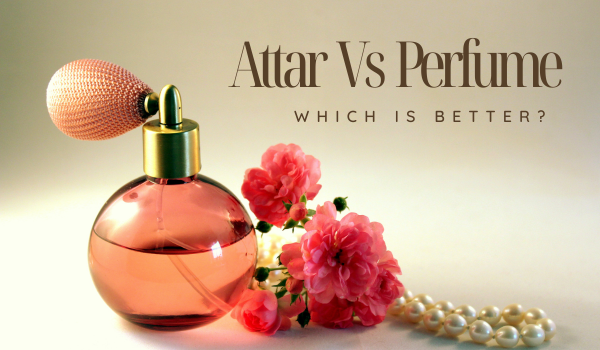Fragrance matters big time. It not only helps us in smelling good, covering up body odor and boosting confidence, but it is also a mood enhancer. Have you ever caught a whiff of a familiar scent and felt so good, as if you were instantly transported to another time or place? Well, that is the magic of fragrance, my friend.
Today, fragrances are available in different forms in the market, like perfumes, attars, deodorants, colognes, body mists, etc. Despite these, the OGs in fragrances, i.e., perfumes and attars, have a cult following of their own. If you do not know the difference between them, then continue reading to learn more about these aromatic warriors.
Attar
An attar or ittar, is a highly concentrated perfume derived from natural sources. Unlike commercial perfumes that often use synthetic ingredients, attars are crafted through a traditional and meticulous process that typically involves steam distillation or cold pressing of aromatic plants, flowers, roots, barks or herbs. This method captures the essence of these natural raw materials, resulting in pure and undiluted fragrances.
Attars are known for their rich and complex scents and are often associated with cultural and historical significance in various regions. Apart from their authenticity and origin, attars have become prized for their distinct, sharp, and long-lasting scent.
Also Read: How to Remove Sweat Smell from Clothes
Perfume
Perfumes are in high demand in the scent industry. Like an attar, a perfume is also crafted to make you smell amazing. However, unlike an attar, a perfume is carefully crafted by blending essential oils extracted from natural sources like flowers or spices with synthetic compounds. This aromatic potion is often diluted with alcohol and left to age, allowing the fragrance to mature into an enchanting perfume that graces your skin.
Now that you know the key difference between attar and perfume, let's dive in a bit deeper to know their pros and cons.
Pros of using attar
1. Crafted from natural sources like flowers, aromatic plants, and herbs. Attars offer a pure and authentic fragrance, along with being free from synthetic additives.
2. With fewer or no synthetic ingredients, attars appeal to those who are seeking a more natural and skin-friendly fragrance option.
3. Despite their subtle nature, attars last long (anywhere between 7 to 24 hours) due to their concentration, pure essence, and other conditions.
4. Attars are biodegradable and, hence, an eco-friendly option.
5. Attars are often deeply rooted in cultural practices. This adds a sense of tradition and history to the fragrance.
Cons of using attar
1. As attars are made from natural ingredients, they have a comparatively shorter shelf life when compared to perfumes.
2. Attars have a comparatively limited range of scents when compared to the diverse options available in the perfume world.
3. Finding a specific attar can be a struggle, as they might not be readily available as commercial perfumes.
4. Attars are slightly thicker in consistency and traditionally applied directly to the skin, i.e., by dabbing them onto your pulse points, such as your wrists, behind the ears, or neck. This can be less convenient for people who are used to the spray-and-go type of method.
5. Since attars are made from natural ingredients, they can potentially spoil over time if not stored properly or if exposed to unfavorable conditions.
Pros of perfumes
1. Perfumes are available in a variety of scents, ranging from floral to fruity to woody to spicy. Thus, catering to every nose preference.
2. Perfumes come in various concentrations, from the light Eau de Toilette (EDT) to the intense Eau de Parfum (EDP). This helps users choose a perfume based on their desired strength.
3. Many perfumes are formulated to have a long-lasting effect, which can literally mask your body's odor throughout the day.
4. Due to advancements in perfume technology, nowadays you find many different scent combinations incorporating both natural and synthetic ingredients. This is a big win for users.
5. From beauty stores to online shopping sites, perfumes are easily available in both offline and online stores.
Cons of using perfumes
1. Some perfumes may contain synthetic ingredients that may cause skin irritation, allergies, or sensitivities in some people with fragrance-related issues.
2. The strong and lingering scent of perfumes can be overpowering, especially in confined spaces or for those who are sensitive to fragrances.
3. High-quality and branded perfumes are often expensive, making them a luxury that not everyone can afford.
4. The production of synthetic ingredients and sleek packaging of perfumes may contribute to environmental issues.
FAQs
1. What is the difference between applying an attar and perfume?
Applying an attar involves dabbing a small amount or a couple of drops of it directly onto pulse points, such as the wrists, neck, or behind the ears. This is due to the attar's slightly thick consistency and concentrated nature. In contrast, perfume is usually sprayed onto the skin or clothing from a distance to disperse the fragrance evenly.
2. Which is more long-lasting - attars or perfumes?
Attars tend to be thicker in consistency and have a long-lasting fragrance due to their high concentration of natural oils. However, the intensity and longevity of attars and perfumes can vary based on an individual's body chemistry and certain ingredients used in the fragrance.
3. Can perfumes and attars be layered together?
Yes. Perfumes and attars can be layered to create a unique and personalized scent. However, it is important to ensure that the fragrances complement each other well to avoid an overpowering or conflicting scent.
4. Are perfumes or attars more suitable for sensitive skin?
Attars being derived from natural ingredients can be more suitable for sensitive skin, as they typically contain no or fewer synthetic ingredients. However, it is always advisable to test a small amount of any fragrance (be it attar or perfume) on a small patch of skin before use.


















No comments:
Post a Comment